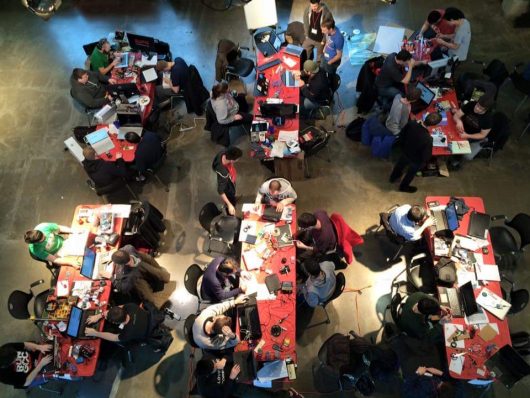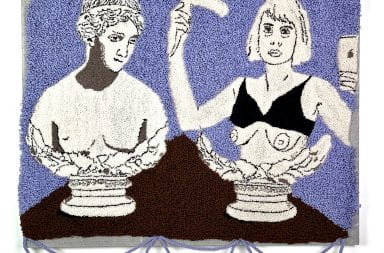
Participants work in teams at the 2015 HackOHI/O competition. Credit: Courtesy of HackOHI/O
More than 700 people are expected to spend the weekend of Nov. 19 and 20 at the Ohio Union, creating technologies that range from an app to help prevent suicide to an alarm that could tell the weather.
Ohio State is holding its fourth annual hackathon, known as HackOHI/O. The technology competition, held every fall, gives individual groups 24 hours to meet people, learn new skills and build projects, such as mobile apps, operating systems and cloud-based software.
Dalton Flanagan, a fourth-year in computer science and engineering and an organizer for Hack OHI/O, said the goal of this event is to cultivate anenvironment on campus that helps students practice what they learn in class.
“We want to foster a tech culture at Ohio State,” Flanagan said. “… (HackOHI/O) allows you to supply what you are learning in a classroom.”
Arnab Nandi, an assistant professor in computer science and engineering and director of HackOHI/O, said it promotes diversity of thought, which means no professional background is required, and students from all majors can participate the event.
“We want people from different parts of Ohio State, not just computer science,” Nandi said. “So you shouldn’t think of this as a place where you only have to come and perform and build something, you can also come and learn something.”
Prior to HackOHI/O, a series of workshops are held to help participants team up and gain knowledge. During the event, there are mentors to provide guidance in software developing and coding.
More than 60 faculty, staff and alumni engineers from top technology companies, like IBM and Google, will evaluate works based on technical difficulty, creativity, usefulness and presentation.
After the competition, 10 teams will be chosen as the top 10 finalists. They will get a chance to showcase their works on stage and earn prizes, such as an Apple Watch and an Amazon Echo smart speaker.
Taylor Case, a fourth-year in computer and information science, attended the hackathon last year. His team won the first prize for making a website and a corresponding app called Join Platz. They are used by people who have parking spots to sell their space to those looking to park there for events, which Case called “the parking version of Airbnb.”
“I think learning a lot is the biggest part of the hackathon, which makes it so fun,” Case said. “Because we learned all about the different technologies we used, getting a website to (communicate with) the mobile app, and we’ve never done that before.”
Those interested in attending the hackathon can register on the program’s website.


